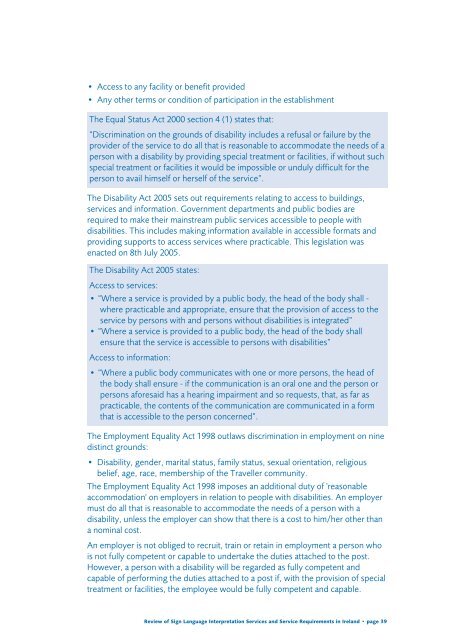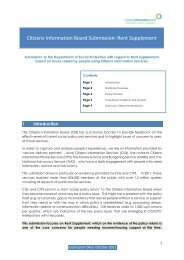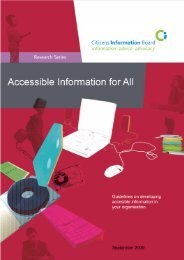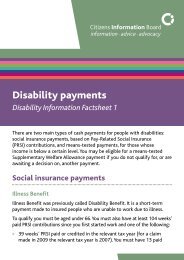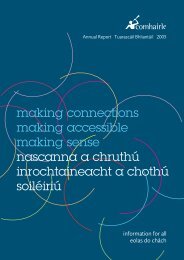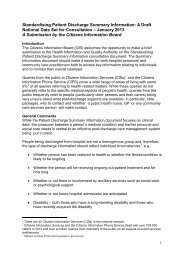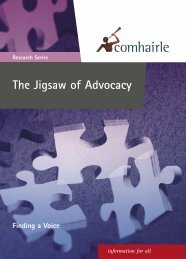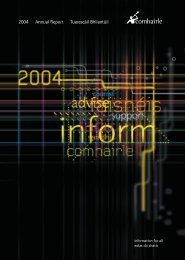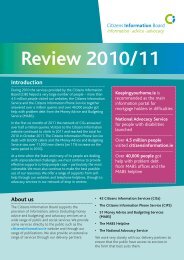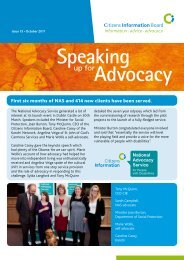Review of Sign Language Interpretation Services and Service ...
Review of Sign Language Interpretation Services and Service ...
Review of Sign Language Interpretation Services and Service ...
- No tags were found...
You also want an ePaper? Increase the reach of your titles
YUMPU automatically turns print PDFs into web optimized ePapers that Google loves.
• Access to any facility or benefit provided• Any other terms or condition <strong>of</strong> participation in the establishmentThe Equal Status Act 2000 section 4 (1) states that:“Discrimination on the grounds <strong>of</strong> disability includes a refusal or failure by theprovider <strong>of</strong> the service to do all that is reasonable to accommodate the needs <strong>of</strong> aperson with a disability by providing special treatment or facilities, if without suchspecial treatment or facilities it would be impossible or unduly difficult for theperson to avail himself or herself <strong>of</strong> the service”.The Disability Act 2005 sets out requirements relating to access to buildings,services <strong>and</strong> information. Government departments <strong>and</strong> public bodies arerequired to make their mainstream public services accessible to people withdisabilities. This includes making information available in accessible formats <strong>and</strong>providing supports to access services where practicable. This legislation wasenacted on 8th July 2005.The Disability Act 2005 states:Access to services:• “Where a service is provided by a public body, the head <strong>of</strong> the body shall -where practicable <strong>and</strong> appropriate, ensure that the provision <strong>of</strong> access to theservice by persons with <strong>and</strong> persons without disabilities is integrated”• “Where a service is provided to a public body, the head <strong>of</strong> the body shallensure that the service is accessible to persons with disabilities”Access to information:• “Where a public body communicates with one or more persons, the head <strong>of</strong>the body shall ensure - if the communication is an oral one <strong>and</strong> the person orpersons aforesaid has a hearing impairment <strong>and</strong> so requests, that, as far aspracticable, the contents <strong>of</strong> the communication are communicated in a formthat is accessible to the person concerned”.The Employment Equality Act 1998 outlaws discrimination in employment on ninedistinct grounds:• Disability, gender, marital status, family status, sexual orientation, religiousbelief, age, race, membership <strong>of</strong> the Traveller community.The Employment Equality Act 1998 imposes an additional duty <strong>of</strong> 'reasonableaccommodation' on employers in relation to people with disabilities. An employermust do all that is reasonable to accommodate the needs <strong>of</strong> a person with adisability, unless the employer can show that there is a cost to him/her other thana nominal cost.An employer is not obliged to recruit, train or retain in employment a person whois not fully competent or capable to undertake the duties attached to the post.However, a person with a disability will be regarded as fully competent <strong>and</strong>capable <strong>of</strong> performing the duties attached to a post if, with the provision <strong>of</strong> specialtreatment or facilities, the employee would be fully competent <strong>and</strong> capable.<strong>Review</strong> <strong>of</strong> <strong>Sign</strong> <strong>Language</strong> <strong>Interpretation</strong> <strong><strong>Service</strong>s</strong> <strong>and</strong> <strong>Service</strong> Requirements in Irel<strong>and</strong> • page 39


